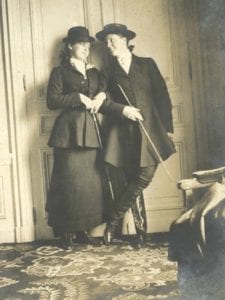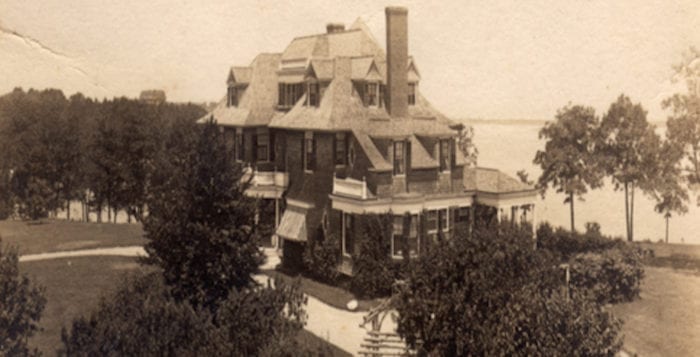A suffragist and philanthropist, who summered in the Village of Poquott, continues to help women nearly 100 years after her death.
Annie Rensselaer Tinker was the daughter of banker Henry Tinker, who bought a mansion in the Village of Poquott in the late 1800s, according to the village’s historian Christoper Ryon. Despite her death in 1924, just short of her 40th birthday, Annie Tinker’s inheritance from her father in 1914 would go on to establish a charity to aid retired women who no longer had adequate means of support.
“She died early, but she had a very rich life,” Ryon said.

Tinker, who was born in 1884, spent her younger years in Poquott swimming, sailing and horseback riding and went on to be a champion for women. She became a suffragist, Ryon said, and Tinker, an accomplished equestrian, formed and trained a women’s cavalry in 1911 that protected other suffragists when they participated in parades.
Tinker enlisted in the British Red Cross during World War I, according to Ryon. During her time giving aid to soldiers on the front lines, her father died and left the Poquott home to her. After World War I, she decided to stay in Paris, and in 1924, died due to complications from tonsillitis surgery in London.
Catherine Tinker, who is not a descendant of the Poquott family, has done extensive research on Annie Tinker’s life. She believes the suffragist saw the horrors of World War I when she was a member of the Red Cross on the front lines in Belgium, France and Italy.
“I think she was truly independent and could have lived a life of luxury in any way she chose, but she put herself in service of others and had this compassion for the fight for women’s right to vote, to nurse the wounded during World War I in Europe and to leave her money to help older working women who could no longer work for a living,” Catherine Tinker said. “That’s kind of amazing.”
A charity first called the Annie R. Tinker Memorial Home was established in 1924 shortly after Tinker’s death following wishes detailed in her will. In later years the name was changed to the Annie Tinker Association for Women Inc., according to Tinker, a former president and CEO of the foundation. The charity operated out of an office in Manhattan until 2018 when it was dissolved.
The mission of the organization was to provide small monthly stipends to retired women who applied for grants so they could remain in their homes. In 2017, the foundation provided assistance to 25 women, according to Tinker.
The former foundation president said last year the board of trustees decided to dissolve the foundation, and the remaining assets were donated to similar charities while the bulk of the money was transferred to the New York Community Trust, which created a new fund named the Annie Rensselaer Tinker Fund. The intent of the new fund is to support projects and policies that maintain the independence and dignity of aging women in New York. Tinker said the hope is that the general projects through the trust will help more women.
“It should go on in perpetuity, so the legacy of Annie Tinker is there,”
she said.
Tinker said Annie Tinker had hoped the Poquott home would one day be a retreat for older women; however, it eventually was inherited by her brother after a long probate case. While Tinker had bequeathed her estate to her friend Kate Darling Nelson with the property being donated to the charity for retired women, her mother fought for half of her daughter’s money and won. However, her friend still inherited half of the fortune and established the charity as Annie Tinker wished.
Through the decades the foundation helped women who lived alone and may not have had the support of family, Catherine Tinker said. She said women who received funds from the foundation were encouraged to mingle with each other with book clubs, holiday and tea parties, which many times the board members would attend, and the get-togethers formed what she called a “Tinker family.” The former CEO said many of the women enjoyed careers as artists and didn’t have pensions or substantial Social Security payments. During her days as a suffragist, Annie Tinker had met many female artists from Gramercy Park.
“When the foundation really tried to reach out to women artists, I think that was natural, because I think they were women Annie herself would have liked to help,” Tinker said.
For more information about Annie Tinker, visit https://lihj.cc.stonybrook.edu/#articles_4692 for a Long Island History Journal article written by Catherine Tinker.





